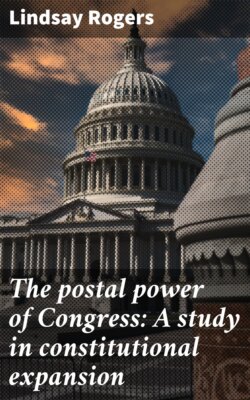The postal power of Congress: A study in constitutional expansion

Реклама. ООО «ЛитРес», ИНН: 7719571260.
Оглавление
Lindsay Rogers. The postal power of Congress: A study in constitutional expansion
The postal power of Congress: A study in constitutional expansion
Table of Contents
PREFACE
THE POSTAL POWER OF CONGRESS
CHAPTER I. Introductory: The Antecedents of the Power
CHAPTER II. The Power of Congress to Establish Postoffices
CHAPTER III. The Power of Congress to Establish Postroads
CHAPTER IV. Limitations on the Postal Power
CHAPTER V. The Power of the States to Interfere with the Mails
CHAPTER VI. The Extension of Federal Control over Postroads
CHAPTER VII. The Extension of Federal Control through Exclusion from the Mails
TABLE OF CASES
INDEX
VITA
Footnote
Отрывок из книги
Lindsay Rogers
Published by Good Press, 2021
.....
Ten days later, the Committee’s report being under consideration it was proposed that the words “and postroads” be added. This was carried by a close vote, though it is difficult to attribute the opposition to any source other than a general fear of giving the federal government too much power and thus endangering the chances for adoption.38 To this feeling also, may be ascribed the result that, when, later, some urged the insertion of an additional grant “to regulate stages on the post roads,” the proposal was not reported from the Committee of Detail.39 Such a power has, however, been fully exercised.
The report of the Committee of Style, made on September 12, fixed the grant as that “to establish postoffices and postroads,” this being the form in which it became a part of the Constitution.40 Dr. Franklin, however, advocated that there be added “a power to provide for cutting canals where deemed necessary.”41 The motion was seconded, but Mr. Sherman started the opposition by objecting on the ground that the “expense in such cases will fall on the United States and the benefits accrue to the places where the canals may be cut.” Mr. Wilson, on the contrary, argued that instead of being an expense to the United States, the canals might be made a source of revenue, and Madison wanted “an enlargement of the motion into a power to grant charters of incorporation where the interest of the United States might require, and the legislative provisions of the individual states might be incompetent. His primary object, however, was to secure an easy communication between the states which the free intercourse, now to be opened, seemed to call for. The political obstacles being removed, a removal of the natural ones as far as possible ought to follow.”42 The question, however, was limited to the single case of canals, and when put to a vote was defeated, because there was an antipathy to monopolies,43 and because, as Gouverneur Morris admitted, “It was extremely doubtful whether the Constitution they were framing could ever be passed at all by the people of America; that to give it its best chance, however, they should make it as palatable as possible, and put nothing into it, not very essential, which might raise up enemies.”44
.....